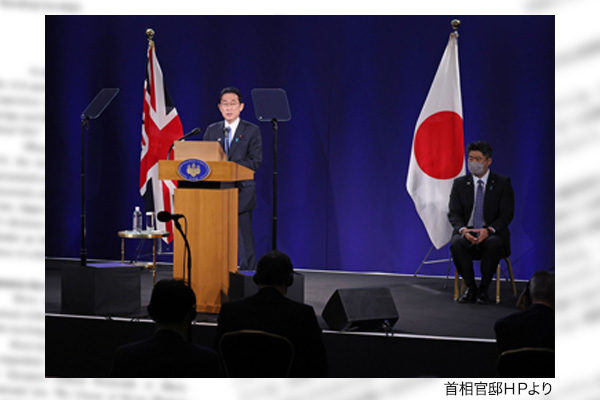“Ukraine is tomorrow’s Asia,” Japanese Prime Minister Fumio Kishida said at a press conference at the end of his recent six-nation tour, demonstrating Japan’s solidarity with Western countries that counter revisionist states of China and Russia. The remark represents an appropriate judgment, given that Ukraine is Russia’s western neighbor while Japan is its eastern neighbor. Furthermore, China seeking a regional supremacy in front of Japan has formed a new axis with Russia. However, Kishida’s foreign policy is vulnerable because his administration’s much-touted economic sanctions on Russia have not accompanied the enhancement of deterrence commensurate with the sanctions. Any powerful foreign policy is on shaky ground without a defense buildup to support it.
Growing Japan-Europe solidarity
New Russia sanctions announced by Kishida expand the scope of Russian individuals subjected to asset freeze and Russian organizations subjected to export bans and prohibit high technology exports to Russia. The Japanese prime minister emphasized that he turned around the Russia policy under the recognition that an autocratic country’s aggression could come in tomorrow’s Asia. This might have been an appropriate action to check China, given that a Chinese Foreign Ministry spokesperson commented that Japan was using exaggerated Chinese threat as an excuse to increase its national power.
During his recent visits to three Southeast Asian countries – Indonesia, Vietnam and Thailand, Kishida called for international unity against Russia’s aggression on Ukraine and stressed that any attempt to unilaterally change the status quo cannot be tolerated at any part of the world. Kishida also visited Britain, where he basically agreed with his British counterpart Boris Johnson on a Reciprocal Access Agreement to enhance the Japanese Self-Defense Forces’ ties with British forces, paving the way for the two countries to form a quasi-alliance. It was a big step forward.
Last year, Britain, Germany and France sent naval ships to the Indo-Pacific region in consideration of China’s rise and power balance shift, advancing Japan-Europe relations dramatically. Regarding the current Ukraine crisis, Yoshimasa Hayashi on April 7 became Japan’s first foreign minister to participate in a meeting of North Atlantic Treaty Organization foreign ministers as partner, upgrading Japan’s relationship with Europe. This is because the Indo-Pacific region cannot be free from Russia’s challenge to the liberal international order.
Do not show vulnerabilities to Russia
As NATO places growing hopes on Japan, however, the absence of accompanying Japanese actions may disappoint member countries. Among other Russian neighbors, Germany has dramatically changed its military policy, offering to raise its defense spending to 2% or more of its gross domestic product and provide offensive weapons to Ukraine.
As autocrats, when finding vulnerabilities in neighboring countries, are tempted to intervene in or provoke those countries, any vague attitude on the part of Japan is dangerous. If Japanese actions are taken as empty, China and Russia that conceive strength as justice may bare their fangs. Russian forces have already used helicopters to violate Japanese air space off Hokkaido and sent naval ships to sail through the Tsugaru, Soya and Tsushima straits in or around Japan. They have conducted military drills on the Russian-occupied Japanese Northern Territories twice and announced two submarines’ successful test-firing of cruise missiles in the Sea of Japan.
Russian President Vladimir Putin’s foreign policy approach first strikes vulnerabilities in foreign countries and regards their concessions as a sign of weakness. Therefore, it is the most important for Russian neighbors to work together in maintaining the balance of power without showing any vulnerabilities.
Hiroshi Yuasa is a Planning Committee member and a senior fellow at the Japan Institute for National Fundamentals. He is also a columnist for the Sankei Shimbun newspaper.


